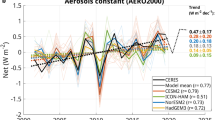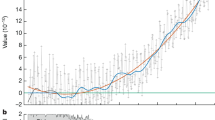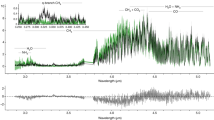Abstract
THE fact that F2 region critical frequencies and solar activity correlate in a general way is well known. Moreover, I have shown1 that the effect of changes in ionization which occur throughout the year can be eliminated in such a way as to bring out a clear-cut correspondence between these critical frequencies and smoothed average sunspot numbers. In an effort to find a more sensitive index for correlation purposes, a study has been made using both whole disk and central zone character figures for calcium and hydrogen flocculi as well as relative sunspot numbers. It has been found that the central zone indexes are better than those for the whole disk. When the monthly averages of the character figures for calcium flocculi are used, it is found that no smoothing is necessary, provided the effect of changes that occur throughout the year is eliminated.
This is a preview of subscription content, access via your institution
Access options
Subscribe to this journal
Receive 51 print issues and online access
$199.00 per year
only $3.90 per issue
Buy this article
- Purchase on Springer Link
- Instant access to full article PDF
Prices may be subject to local taxes which are calculated during checkout
Similar content being viewed by others
References
"On the Ionization of the F2 Region." Proc. Inst. Radio. Eng., 25, (Nov. 1937).
Author information
Authors and Affiliations
Rights and permissions
About this article
Cite this article
GOODALL, W. The F2 Region as an Indicating Mechanism for Solar Activity. Nature 143, 977–978 (1939). https://doi.org/10.1038/143977a0
Issue Date:
DOI: https://doi.org/10.1038/143977a0
Comments
By submitting a comment you agree to abide by our Terms and Community Guidelines. If you find something abusive or that does not comply with our terms or guidelines please flag it as inappropriate.



